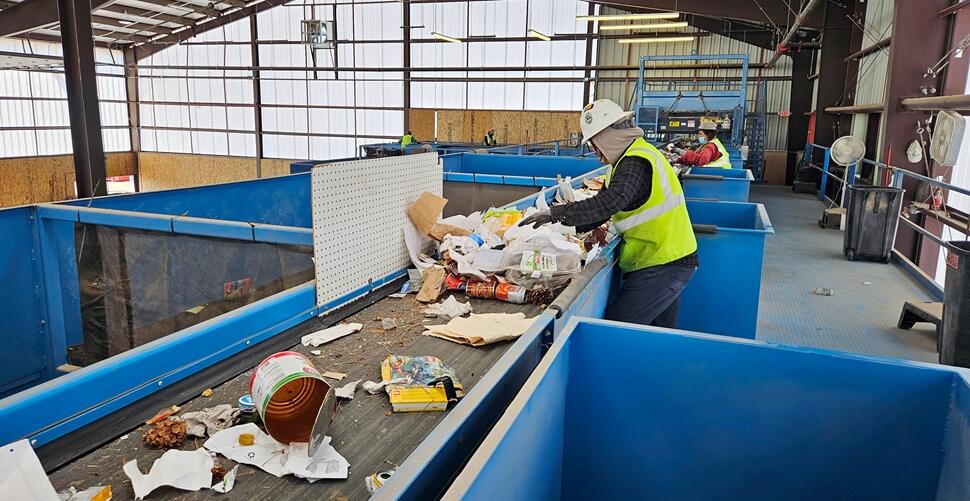Colorado Recycling Company Tackles Dirty Work With Cleaner Power

Just a year after the most commonly used LEED (Leadership in Energy and Environmental Design) ratings were established, Phoenix Recycling began contributing to LEED-certified building projects. When the company built a new facility in 2016, it became the only one in the county to sort single-stream recycling and construction waste on one set of conveyors.
And just this year, they became the first waste and recycling operation in the area to incorporate electric heavy equipment into their fleet. Their machine of choice? An L20 Electric compact wheel loader (CWL) made by Volvo Construction Equipment and purchased from Power Equipment Company.
“This machine is the perfect size for the job it’s doing,” says Mark Thompson, owner and manager of Phoenix Recycling. “We’re not pushing it to its limits yet, and it can definitely handle everything that our old diesel machine did.”
At about 10,000 pounds, the L20 Electric loader has a 1.05-cubic-yard bucket and can work with other attachments like a fork or a plow. The team primarily uses it to scoop waste from a pile and dump it onto a conveyor for sorting.
Because state regulations dictate that waste must be processed indoors (with a carbon monoxide alarm), the CWL is never far from power — although it’s not usually needed during a shift. Thompson says an overnight charge will last all day, but operators sometimes plug it in over lunch to top it off.
“It’s always within 150 feet of an outlet,” he says. “We planned to install a 220-volt outlet but haven’t needed it yet. We’re just using a standard 110-volt outlet and can hardly believe it!”
Thompson says they may eventually add another shift, which could require adjustments to the charging schedule or prompt them to upgrade to the 220-volt outlet for faster charging.
A Simple Journey to Sustainability
Phoenix Recycling is always looking for ways to work more sustainably, so when Thompson and a couple of his employees attended a 2024 operator training event at a Power Equipment branch in Grand Junction, he was eager to learn about and try the battery-powered wheel loader.
“I thought it was really cool, and it led me to do some research,” he says.
A little over a year later, when his diesel CWL from another brand broke down, the Volvo L20 Electric came to mind and Thompson reached out to Stacey Mousner, a sales product support rep at Power Equipment’s Durango branch.
“It got here for a demo, and it never left,” he says. “We needed something right away and we liked it, so that was that.”
Employees have especially enjoyed the reduction in noise and fume levels.
“The fewer things that make noise in that space, the better,” Thompson says. “They like being able to hear their music, and there are no smelly diesel engine regens.”
As for a learning curve, the main operator of the L20 Electric wheel loader told Thompson that it’s operationally the same as its diesel counterpart. After Mousner gave them a brief training and adjusted a couple of electronic features, they were off and running.
“The dealer support was a big factor in my decision to get the machine,” says Thompson. “Being able to make a phone call and have someone show up quickly is big because we have a small team, and you can’t just call a local garage for things like this. Stacey is awesome to work with.”
Return on Investment Won’t Take Long
Battery-electric construction equipment currently has a higher purchase price than diesel equivalents, but several benefits should offset that investment fairly quickly.
“We have a diesel tank on-site for other machines, and I bet it won’t take long to notice the drop in our fuel consumption,” says Thompson.
The absence of an internal combustion engine and many of the moving parts found in diesel machinery means a significant reduction in maintenance time and supplies too. In fact, Volvo conservatively estimates that users of their electric machines will save up to 35% in maintenance costs and time.
On top of that, electric machines don’t idle like diesel machines do, which eliminates unnecessary wear and tear and slows the accumulation of operating hours.
“We’re hoping to see a lower total cost of ownership over time,” says Thompson, noting they have not had any maintenance or repair needs in their first few months with the machine.
Depending on location, electric equipment purchases may qualify for grants or tax incentives as well. Their immediate need for the L20 Electric led Phoenix Recycling to purchase the machine outright, but Thompson says grants could have helped if they had time for that process.

Renewable Power for an Environmentally Focused Business
In addition to its residential and construction recycling business, Phoenix Recycling has a document shredding division and a biomass division, which removes and processes logging residuals from forests. Much of the company’s equipment is already electric, and Thompson plans to keep the transition going.
They currently use a diesel-powered loader to feed material into an electric baler to prepare it for transport. But the plan is to replace all diesel-powered loaders and skid steers with electric versions as they age out, leading to a fully solar-powered fleet in the future.
“We’re in the process of installing solar arrays on the roof, so we’ll soon be operating entirely on solar power, including charging the L20 Electric,” says Thompson. “It makes for a great story to be able to say we use solar power and electric equipment, because the recycling industry is meant to support sustainability.”